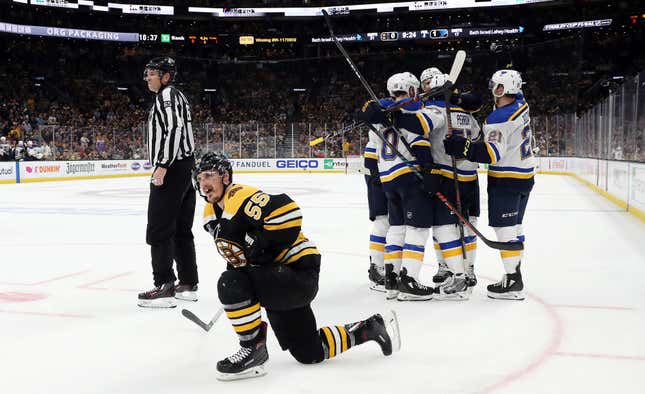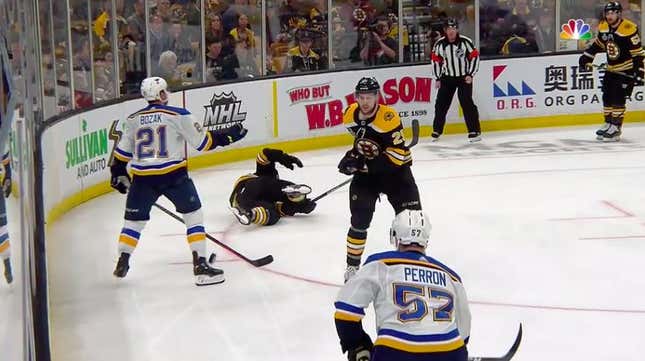
I’m tired. Of officials blowing big, important calls in the playoffs, mostly, but also of having to write blogs about them that try to say something more intelligent than well, it’s bad to get these calls wrong in such big moments, but also being an NHL official is a difficult job and even the best are going to screw up sometime and there’s no conspiracy at work here, but also there have been an awful lot of these in crucial moments this spring so maybe we should add another official, perhaps suspended above the ice in a harness and shuttled around like a skycam? So maybe for this one I’ll take you “inside the game” and make the explicit the formula with which these blogs can now be written almost by reflex.
Like how this is the graf where I run down the previous bad and blown calls in the postseason to illustrate just how many there’ve been and how crucial they were, but also I’ll assume most readers remember them so I’ll just link to them rather than describing them, and also internal linking is good for traffic. The phantom major on Cody Eakin that set up a wild Sharks comeback in the first round; the offside on Gabriel Landeskog in round 2 that was more a failing of the rulebook and the challenge system; Timo Meier’s handpass.
Now let’s do some foreshadowing of Thursday’s Game 5 by recalling how, after Game 3, St. Louis coach Craig Berube used his press conference to work the refs, complaining how many calls they had been making on his team. It wasn’t that any of the individual calls had been bad or unfair, really, which Berube knew very well. The Blues are by far the more physical team in this series, playing “heavy hockey” that relies on a strong forecheck and making life miserable for Boston’s skaters. It was just gamesmanship intended to get officials to maybe think a little harder about reaching for their whistles. To Berube’s comments, Bruins coach Bruce Cassidy cracked what he definitely thought at the time was a joke:
“We’re ready for a physical game and we’re not going to concern ourselves with the officials. Until they stink and they go against us, right?,” Cassidy joked after morning skate.
Which brings us to (after much noodling around; perhaps too much for those readers who just want to know who won the damn hockey game and have already clicked away) Game 5, which, as you guessed (because of all the context and foreshadowing I helpfully provided above this! You’re welcome.) may have swung on an egregious no-call that went against the Bruins. In the third period with the Blues nursing a 1-0 lead, Tyler Bozak slew-footed Noel Acciari right in front of a pair of officials. No call, and seconds later, David Perron scored. St. Louis would hang on to win 2-1 and take the 3-2 series lead.
Do I have a screengrab from the NBC broadcast that highlights how badly this one was missed? You better believe it. The ref is right there, and even more tellingly, you can see Bozak raising his arm to protest ... something. He sure looks like a guilty man, complaining to the ref about a penalty that he expected to be called on him but never was. Even the more charitable interpretation, that he was prepared to complain about a dive from Acciari, doesn’t really do him too many favors once you learn that Acciari hit his head on the ice and was removed from the game to go through the concussion protocol, generally not outcomes of a dive.

Now here’s the point in a bad-officiating blog where I pass along the ineffectual non-statement from the league, or in this case its director of officials. “We don’t make comments on judgment calls within games,” Stephen Walkom said. “There are hundreds of judgment calls in every game. The official on the play, he viewed it and he didn’t view it as a penalty at the time.”
I might also consider relaying a quote from the offending player in which he says something along the lines of I’m not sure what happened out there but definitely doesn’t admit to committing an infraction, but I won’t because you already knew in your heart that Bozak said almost exactly that.
Now (finally, and with great disrespect to the inverted pyramid) is the part of the blog when I blockquote Cassidy’s fiery reaction to the play and to officiating in general.
“The National Hockey League’s getting a black eye with their officiating in these playoffs, and there’s another one that’s going to be talked about,” Bruins coach Bruce Cassidy said.
“It’s right in front of the official. It’s a slewfoot. Our guy’s gone. The spotter took him out of the game for a possible concussion. I mean, it’s blatant. It had a big effect on the game.”
(Here is the point where I parenthetically point out the obvious, that while it did have a big effect on the game, the Bruins probably deserved to lose anyway. Jordan Binnington was a beast when he was tested, and St. Louis is working some sort of dark magic to completely shut down Boston’s “Perfection Line,” and non-calls don’t score goals for your opponent, and one goal for you 60 minutes isn’t gonna do it no matter how many calls go against you. I acknowledge all this because it’s true but mostly because it’ll head off complaints from Blues fans who like to hear themselves talk.)
To add a little more context for Cassidy’s comments, context that would have disrupted the flow of this blog had I given it before the quote, the Bruins believe Berube’s working of the refs before Game 4 had a real effect. “He made a comment to the refs about them being this angelic team about not taking penalties all playoffs,” David Backes said, “and all of a sudden the whistles are put away.” I, the objective blogger, caution that you can’t judge officiating by the number of calls, but do note ominously that the Bruins averaged 4.7 power plays per game through the first three games of this series, and just 2.5 per game in the last two.
It can be a struggle to wrap up these bad-officiating blogs because it’s difficult to say anything concrete beyond this shouldn’t be happening so much and the NHL knows it shouldn’t be happening so much and they’ll probably discuss it in the offseason but what can they really do?, but I’ll attempt to end on a pseudo-profound note by observing that, on some level, the NHL’s real problem is not the unfairness delivered upon teams by bad calls in big moments, but rather the fact that everybody’s talking about the officiating at all, instead of some excellent hockey being played. I’ll also conveniently elide the fact that I’m helping to make it a self-fulfilling prophecy by writing about the officiating rather than the hockey. But that’s how these blogs go.